Employee Spotlight: Spread Your Wings and Fly (Like a Butterfly)
NHA Communications TeamNHA Communications Team
Articles by NHA Communications Team
-
How NHA Schools Help Urban Students Close Achievement Gaps
Published: Oct 09, 2025
-
From Music Teacher to Leader: Celebrating Wendy Barajas’ 27 Years with NHA
Published: Oct 02, 2025
-
Living Out Wisdom: A Strong Start to Moral Focus™ This Year
Published: Sep 25, 2025
-
How National Heritage Academies Schools Waste No Time for a Strong Start to the Year
Published: Sep 18, 2025
Jeff Verkaik, middle school science teacher at Vanguard Charter Academy, is passionate about getting his students to do real science, which sometimes means hatching butterfly eggs in a classroom.
The butterfly project is multifaceted, and it spans further than just middle school for Mr. Verkaik. The first step is to empower his eighth graders to research monarchs and some of the struggles they face. Once they’ve gathered information, his students go out into the world to collect data by counting milkweed and monarch eggs in a local park.
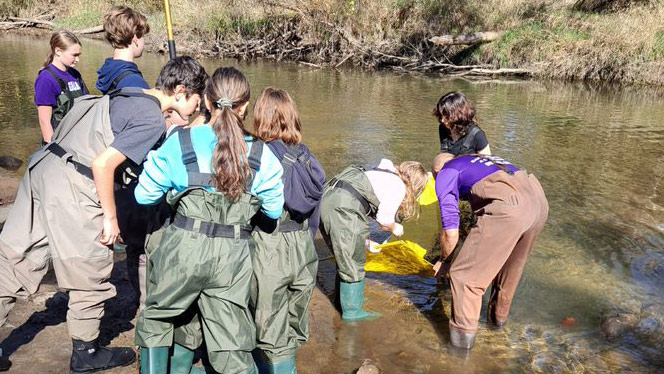
His class even submits the data from their findings to the Monarch Watch, which is an organization that gives people the opportunity to help tag monarchs to help real scientists. This year, Mr. Verkaik’s class found 32 monarch eggs that they hatched in butterfly houses and tagged before releasing them. The tags, which are very small, numbered stickers that adhere to butterfly wings, help scientists study where the butterflies originated and where they’ve gone. But don’t worry – the tags don’t hurt or hinder the butterfly’s ability to fly. When the butterflies have tags, scientists are able to accurately track where they originated.
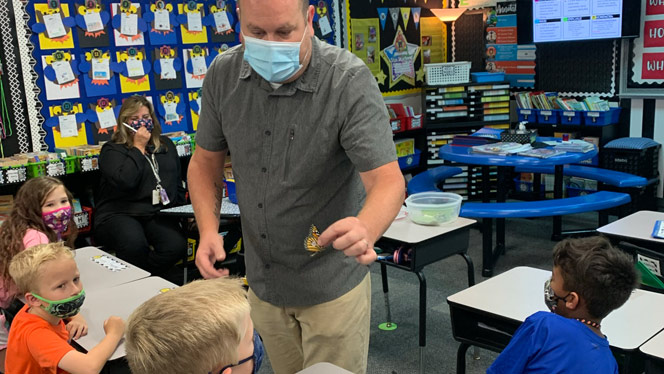
During this project, Mr. Verkaik volunteers his time by visiting younger classes to talk about the lifecycle of butterflies, giving them a unique and fun science experience they can look forward to. He believes the butterfly project is successful because it’s an intersection of passion and relevancy, two things that make learning real.
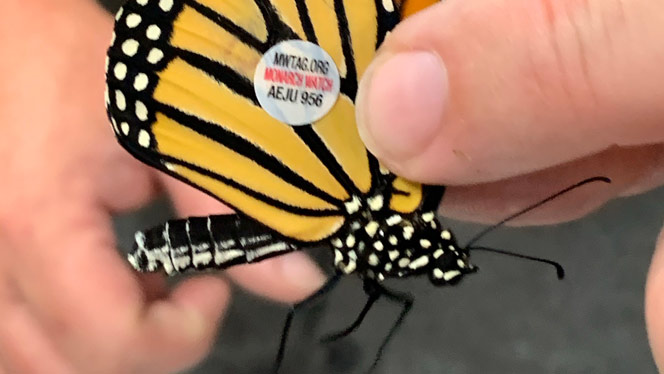
“So many kids love butterflies, the passion was there before I had an idea to make lessons out of it,” he said. “Passion created immediate buy-in. The relevancy comes from the fact that we are doing real science for real scientists who are studying a real problem with the monarch population in the USA. As a teacher, I know that if I can have a lesson that is based on students' passions or has real world relevancy, I most likely have a worthwhile lesson.”
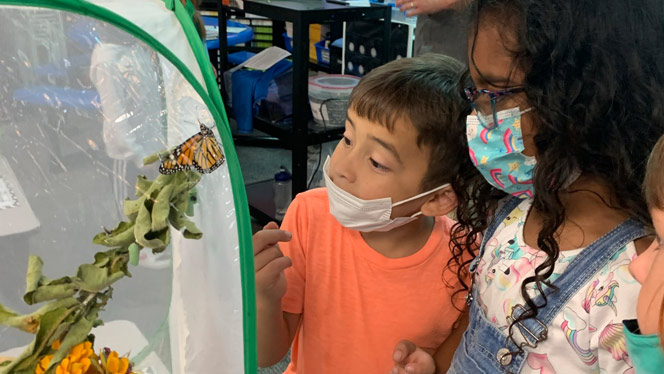
Mr. Verkaik cares about empowering his students to participate in real science because it makes what he’s teaching relevant and accessible to all.
“It is just the way the brain works,” he said. “It is always sorting information and keeping relevant information and discarding irrelevant info. So doing real science gives me a much better chance of getting something to stick in a student’s brain. It is also fun. I want my students to like school. I want them to want to be in my class. I believe that is a huge step toward authentic learning.”
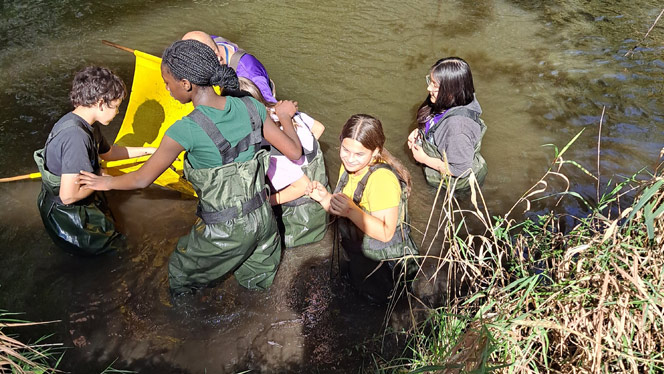
Vanguard Charter Academy, a school in Wyoming, Michigan, is a partner school in the National Heritage Academies network of over 90 tuition-free, public charter schools across nine states, serving more than 60,000 students in kindergarten through 12th grade. For more information, visit nhaschools.com.
Keep up the excellent work, Jeff!
The butterfly project is multifaceted, and it spans further than just middle school for Mr. Verkaik. The first step is to empower his eighth graders to research monarchs and some of the struggles they face. Once they’ve gathered information, his students go out into the world to collect data by counting milkweed and monarch eggs in a local park.

His class even submits the data from their findings to the Monarch Watch, which is an organization that gives people the opportunity to help tag monarchs to help real scientists. This year, Mr. Verkaik’s class found 32 monarch eggs that they hatched in butterfly houses and tagged before releasing them. The tags, which are very small, numbered stickers that adhere to butterfly wings, help scientists study where the butterflies originated and where they’ve gone. But don’t worry – the tags don’t hurt or hinder the butterfly’s ability to fly. When the butterflies have tags, scientists are able to accurately track where they originated.

During this project, Mr. Verkaik volunteers his time by visiting younger classes to talk about the lifecycle of butterflies, giving them a unique and fun science experience they can look forward to. He believes the butterfly project is successful because it’s an intersection of passion and relevancy, two things that make learning real.

“So many kids love butterflies, the passion was there before I had an idea to make lessons out of it,” he said. “Passion created immediate buy-in. The relevancy comes from the fact that we are doing real science for real scientists who are studying a real problem with the monarch population in the USA. As a teacher, I know that if I can have a lesson that is based on students' passions or has real world relevancy, I most likely have a worthwhile lesson.”

Mr. Verkaik cares about empowering his students to participate in real science because it makes what he’s teaching relevant and accessible to all.
“It is just the way the brain works,” he said. “It is always sorting information and keeping relevant information and discarding irrelevant info. So doing real science gives me a much better chance of getting something to stick in a student’s brain. It is also fun. I want my students to like school. I want them to want to be in my class. I believe that is a huge step toward authentic learning.”

Vanguard Charter Academy, a school in Wyoming, Michigan, is a partner school in the National Heritage Academies network of over 90 tuition-free, public charter schools across nine states, serving more than 60,000 students in kindergarten through 12th grade. For more information, visit nhaschools.com.
Keep up the excellent work, Jeff!
